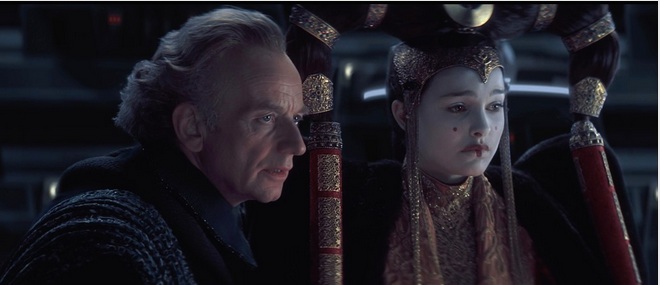TL;DR: I think the premise of this question is flawed. Palpatine climbed the political ladder one step at a time.
I cannot remember any indication from the movies that there are significant steps on the political ladder between senator and chancellor. The only special role is vice chair but the same person (Mas Amedda) occupied this post for the entirety of the prequels. So even if the post comes between senator and chancellor, if Mas Amedda did not want to become chancellor after Valorum’s fall, it is inevitable that somebody has to skip this step.
The following dialogue seems to confirm that chancellors are typically elected from the midst of the senate:
Amidala: Who else has been nominated [for chancellorship]?
Panaka: Bail Antilles of Alderaan and Ainlee Teem of Malastare.
Note that the other candidates are primarily identified with their home planet, i.e., being a senator, and not some other office they hold (e.g., Minister of Death Sticks and Podracing, Governor for the Outer Rim, leader of the Party for Shaving Wookiees).
We do not know how exactly the political system of the Republic works but I would expect that senators represent their home planets, the same way that members of our parliaments represent their electoral districts. Given that planets differ more strongly in location, climate, geology, culture, race and so on, I would be surprised if senators switched the planet they represent. In particular, if you come from a backwater planet, you are stuck with it for life. But this does not have to be a severe flaw for becoming chancellor: if the political culture of the Republic sees the chancellor as a representative of the Republic and not your home planet anymore, your home planet’s influence may have little influence on your chances to become chancellor. Not being affiliated with a major player may even be an advantage if the major players cannot agree on one from their own planets. For a real-life example, take the Presidents of the European Commission, three of which came from Luxembourg.
In the beginning of Episode I, Palpatine already is a senator. For all we know from the movies, he may have been in this post for decades and be well known in the senate. The only indication that Palpatine may be a nobody is the way the Naboo conflict is first brought before the senate, but that may all be ritual and protocol.
So after all we can know, when Palpatine becomes chancellor in Episode I, he is taking the political ladder one step at a time. This also fits into the rest of his modus operandi as seen in Episodes II and III: It takes years before he takes the next step of gaining emergency powers and some more years before he declares himself emperor.
He was heavily multitasking his time to plot the whole Naboo fiasco and other Sith related things, so couldn't have been devoting as much time to political ambition
Well, here the master schemer comes into play. He does not need to have been very busy through the Naboo crisis, if he planned a lot in advance (which he is confirmed to do in the rest of the prequels). He can devote most of his attention to politics and only has to give a few directions here to further his unofficial activities.


